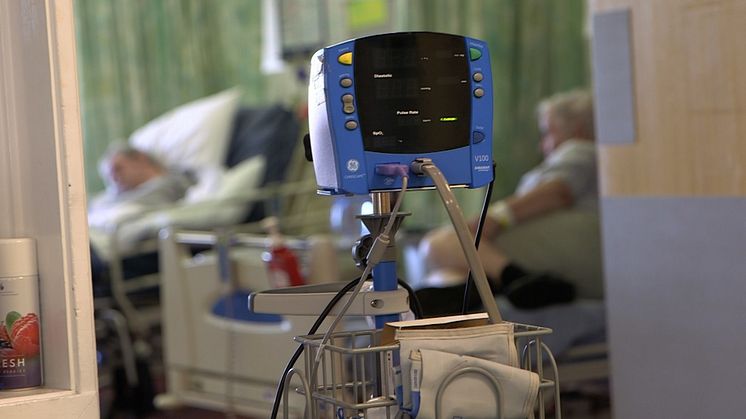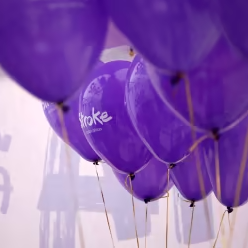
Press release -
Stroke Association warns number of untreated strokes likely to increase this winter, due to rise in Omicron cases
The Stroke Association is concerned that public fear of increasing COVID-19 rates, due to the Omicron variant, is likely to see a similar drop in stroke admissions seen at the start of the pandemic.
During the first wave of the pandemic there was a significant decrease in admissions to stroke wards, when the COVID-19 infection rate rose rapidly. The Stroke Association’s Recoveries at Risk report found this was due to patient worries over catching COVID-19 or being a burden on the NHS. Nearly a third (32%) of people who survived a stroke between March and June 2020 said they delayed seeking medical attention due to COVID-19(i).
This year, with the added impact of reported ambulance delays, this is likely to intensify feelings of being a burden on the NHS, causing people to delay seeking medical treatment.
To add to this potential crisis, new data shows that this year, more people are living with unmanaged hypertension (high blood pressure) and other major stroke risk factors due to fewer regular in-person appointments where cardiovascular conditions (like high blood pressure) are spotted. Hypertension is the biggest risk factor for stroke, contributing to 55.4% of stroke cases (ii). This means that the stroke rate could rise this Christmas as more people live with unmanaged hypertension than in previous years.
In the UK there are over 100,000 strokes per year and 1.3 million stroke survivors. A stroke is a medical emergency which is caused by a blockage or bleed in the brain cutting off blood supply. For every minute a stroke is untreated, 1.9 million brain cells die (iii). Stroke is fatal in over one in eight (13.1%) patients(iv). The main treatments for stroke, thrombolysis and thrombectomy, must be delivered as soon as possible within four and a half hours of symptoms starting, which is why is it vital to call 999 as soon as any sign of stroke appears. Stroke is the UK’s fourth biggest killer and the leading cause of adult disability.
Key stats:
- Acute stroke admissions fell by 10.3% in England, Wales and Northern Ireland in the period 23rd March to the end of May 2020(iv), meaning a drop of over 2,000 admissions in just over two months
- This may have caused the 54% rise in at home deaths for stroke in England and Wales(v).
- Of those who delayed seeking emergency medical attention, 42% hadn’t wanted to burden emergency services (i)
- And 34% of those who delayed seeking emergency medical attention were afraid of catching COVID-19 in hospital. (i)
- 43% reduction in the rate of diagnosis of cardiovascular conditions (including high blood pressure) and a 29-52% reduction in first prescriptions of medications in March – May 2020(vi)
- In 2015, it was reported that high blood pressure affected more than 1 in 4 adults in England (31% of men; 26% of women), which is around 13.5 million people(vii)
Juliet Bouverie, Chief Executive of the Stroke Association said: “When COVID cases rise as quickly as they are doing now, that sets off alarm bells at our charity and everyone involved in the treatment of stroke. More Omicron cases is likely to mean more preventable deaths and disability due to stroke, as people delay seeking emergency medical attention.
“We know that people get scared to go to hospital when cases rise but stroke is a life-threatening condition. Fear of catching COVID and feeling like a burden on the NHS stopped people calling 999 in the past. This is likely to be even worse this Christmas due to the news about ambulance delays. Stroke is an emergency medical condition and should be treated as an emergency from the moment you ring 999.
“You have to remember that stroke is a brain attack and when you see any of the FAST signs of stroke in someone, this means that their brain is dying. You must raise the alarm; you must call 999 immediately.
“After nearly two years in the pandemic we know that many people haven’t had their high blood pressure diagnosed because there haven’t been as many regular, in-person appointments with medical professionals such as GPs. That means more people are living with undetected high blood pressure and are at high risk of stroke. As a result, we could see even more people having a stroke this Christmas than in previous years.”
“Stroke clinicians and nurses as well as paramedics and therapists have worked tirelessly throughout the pandemic to maintain stroke services. Everyone at our charity is thankful for their hard work and support.”
Signs of stroke (FAST test)
Face – Can the person smile? Has their face fallen on one side?
Arms – Can the person raise both arms and keep them there?
Speech problems – Can the person speak clearly and understand what you say? Is their speech slurred?
Time – If you see any single one of these signs, it’s time to call 999
References:
i. Stroke recoveries at risk, Stroke Association. September 2020
ii. Results portfolio data April – June 2021, Sentinel Stroke National Audit Programme (SSNAP).
iii. Saver, J. L. (2006). Time is brain—quantified. Stroke, 37(1), 263-266. https://doi.org/10.1161/01.str.0000196957.55928.ab
iv. A Year Like No Other, The Eighth SSNAP Annual Report, Sentinel Stroke National Audit Programme (SSNAP), December 2021.
vi. Hypertension in adults: diagnosis and management, NICE. August 2019
Topics
Categories
- Stroke strikes every five minutes in the UK and it changes lives in an instant.
- The Stroke Association is a charity working across the UK to support people to rebuild their lives after stroke. We believe that everyone deserves to live the best life they can after stroke. From local support services and groups, to online information and support, anyone affected by stroke can visit stroke.org.uk or call our dedicated Stroke Helpline on 0303 3033 100 to find out about support available locally.
- Our specialist support, research and campaigning are only possible with the courage and determination of the stroke community and the generosity of our supporters. With more donations and support, we can help rebuild even more lives.
- You can follow us on Twitter, Facebook and Instagram.











